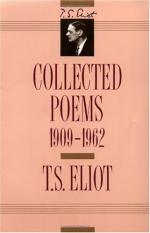|
This section contains 3,206 words (approx. 11 pages at 300 words per page) |

|
The question sounds eminently reasonable, but remains unanswerable: what is revolutionary in the criticism of T. S. Eliot? Everyone—except apparently Eliot himself—can see that the critical tradition of the whole English-speaking world was turned upside down by the trickle of articles and lectures—there has never, strictly, been a critical book—issuing from his pen since the First World War. But the nature of his influence as a critic has always been felt to be mysterious and indefinable…. Disciples—even enemies—have hardly succeeded in identifying what is new and special in Eliot's criticism, though they have been loud both in praise and censure. The most discreet of major English critics, he has practised evasion and reticence with determined skill. In his earliest period, positions were tentatively stated and argument disarmed by a certain irony; in his middle years, argument was openly spurned; and in the...
|
This section contains 3,206 words (approx. 11 pages at 300 words per page) |

|


